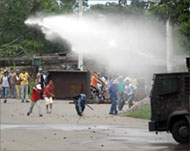Ecuador army retakes oil wells
Ecuadoran soldiers have regained control of a number of oil wells in the northeastern Amazon, officials say.

The move made it possible for the state-run oil company Petroecuador to recover some of its output after demonstrations brought production to a halt.
Protesters are demanding a greater share of oil wealth.
But Energy Minister Ivan Rodriguez said on Friday that the recovery of about 30,000 barrels of crude hardly made up for Ecuador’s lost daily output of 201,000 barrels. The economic impact was “worse than any war,” he said.
Rodriguez said state oil exports had been suspended, in line with a statement Petroecuador issued to customers on Thursday warning that it could not guarantee overseas deliveries because of forces beyond its control.
Rodriguez said protesters late on Thursday had dynamited “a secondary pipeline of (Canadian oil) company EnCana” as well as Petroecuador’s Sacha oil camp.
He said that the protests were putting pressure on Ecuador’s internal reserves and that the country would have to import about $140 million worth of gasoline, diesel and cooking gas to meet internal demand.
Demands
 |
|
Energy Minister Ivan Rodriguez: |
Residents of the Sucumbios and Orellana provinces took over two airports on Sunday and on Monday started blocking roads, overrunning oil camps and sabotaging oil facilities.
Backed by regional officials, the demonstrators are demanding, among other things, that oil companies hire more local workers, provide greater investment in roads and
public works in the zone and make income tax and royalty payments directly into local government coffers.
Television broadcast live images on Friday of police and soldiers using tear gas to repel protesters hurling stones at them in Lago Agrio, 180km northeast of Quito.
Authorities said late on Friday that Sucumbios Provincial Governor Guillermo Munoz had been detained in Lago Agrio, hours after the city’s mayor, Maximo Abad, was arrested on charges of “inciting public disorder”.
Security measures
Petroecuador spokesman Fausto Mejia said only 50 or 60 of the company’s 410 seized wells, about 12% to 15%, had been retaken by security forces and returned to company employees.
 |
|
A state of emergency was |
He said the Libertador oil field in Sucumbios was producing 23,885 barrels, a little less than half its normal daily production.
Petroecuador issued a statement later saying that unidentified assailants had disconnected the control valve of one of the Sacha field wells, causing an oil spill that could not be measured or controlled because protesters blocked the path of technicians sent to respond.
Also, a secondary pipeline was cut, causing “a spill of 600 barrels of crude that contaminated various tributaries of the Aguarico River”, the statement said.
President Alfredo Palacio declared a state of emergency on Wednesday to stem the protests, sending 3000 police and soldiers into the zone.
They moved forcefully on Thursday to retake control of oil facilities, roads, airports and government buildings.
Millions lost
Economy Minister Magdalena Barreiro said Friday that, as an emergency measure, Ecuador had asked Venezuela to loan it oil so Ecuador could still honour its export contracts, Dow Jones Newswires reported.
 |
|
Total losses to the state for |
But Venezuela’s Oil Minister Rafael Ramirez told reporters on Friday that his country hadn’t “received any request for our intervention in this matter … I want to make that very clear”.
Palacio said late on Thursday that total losses to the state for the month of August were $125 million and would climb dramatically if the flow of crude was not restored.
Private companies operating in the northeast Amazon had also reported production losses of 328,000 barrels, he said, representing $18 million, of which the state receives 25% in royalties.